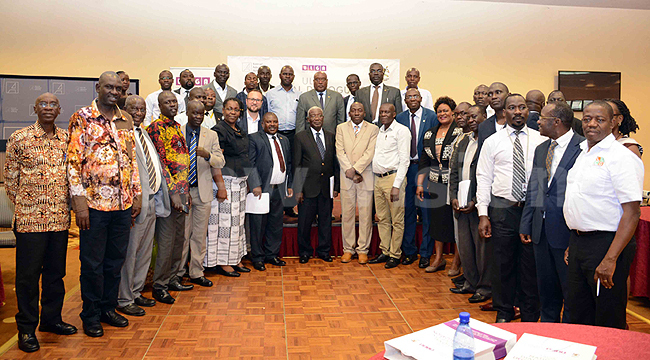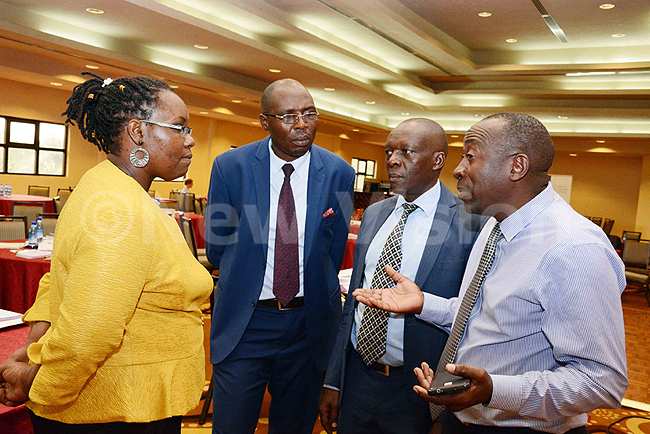We have been suppressed - local gov't leaders
The leaders say the OPM and finance ministry are "usurping their powers".
PIC: Minister Tom Butime (left) chats with local government leaders and civil servants after closing a dialogue on decentralisation in Kampala. (Credit: Eddie Ssejjoba)
GOVERNANCE
KAMPALA - Local government leaders have blamed the Office of the Prime (OPM) for ‘killing' the decentralisation system by suppressing functions of both political and technocrats at the lower units.
This was during a two-day national dialogue on decentralisation in Bugolobi, Kampala.
Participants included district chairpersons and chief administrative officers, chairpersons of planning commissions and other decentralization experts.
The leaders complained about the OPM and the finance ministry for what they termed as "usurping their powers and making efforts to re-centralise the functions of the local government units".

Dialogue participants took a group photo. (Credit: Eddie Ssejjoba)
The chairperson of Bududa district, Wilson Watira, who called for the re-positioning of the decentralisation system, said using the Public Finance Management Act 2015, the finance ministry and OPM had made deliberate efforts to usurp their authority in managing finances, including awarding contracts.
Watira said the OPM, which is charged with assessing the performance of districts, was using the pretext that civil servants in lower units were corrupt and had failed to make timely and proper accountability for funds released to them.
"But corruption is more rooted in the OPM than in any other government department.
"If the funds that have been embezzled in the OPM had been put to the functions of districts, we would have seen far more development," Watira said.
He said some senior civil servants in the OPM who earn a salary of sh2m were busy building skyscrapers using swindled funds at the cost of the "common man" yet they blame districts for being corrupt.
Iganga district chairman Patrick Kayemba regretted that Rwanda and Kenya, who sent their delegations to study and copy Uganda's decentralisation system, were making benefits out of it yet Uganda was weakening its system.
He said the system has been pulled down by technocrats who front re-centralization and have been supported by some chief administrative officers who feel more comfortable reporting to the centre, where they are appointed from.
"Decentralisation was growing but there emerged a shift policy to re-centralisation. We cannot set our priorities, they are set by the finance ministry based on national priorities yet we have different needs and demands."
All financial transactions at lower units were being determined by the Accountant General, including opening a bank account at a sub-county level, Kayemba added.

Mityana LC5 chairman Joseph Luzige chats with colleagues Wilson Watara from Bududa (2nd right) and Patrick Kayemba from Iganga. Looking on left is Rose Gamwera, the secretary general of the Uganda Local Government Association
Abdul Muwanika, acting assistant commissioner in charge of monitoring and evaluation in the OPM, however, said assessment of local government units had been spearheaded by the Ministry of Local Government until February this year when they took over.
He said there were already tangible benefits from their interventions, including identifying weak areas and making recommendations for improvements.
Local government minister Tom Butime said he was going to battle with people making attempts to kill the decentralisation system.
He said he had written a cabinet paper, which he was going to table before cabinet for discussion on Monday, in which he opposes attempts to recall some functions of local governments to the mother ministries, including appointment of district veterinary officers and giving back powers of managing health centre IV facilities to the health ministry.
"For example there is an ongoing debate that for a district veterinary officer to function properly, they should be recruited, supervised and monitored by a commissioner at Entebbe, but this is unconstitutional and violates the Local Government Act and weakens the capacity of local leaders," underlined Butime.
Butime dismissed arguments that in order for a district health officer to fulfill his or her professional work, he or she must be managed and report to the mother ministry, instead of being supervised by local leaders, such as the chief administrative officer.
"The Local Government Act is clear, the mother ministry has every responsibility to monitor, supervise, mentor and advise these officers related to that department without re-centralising these functions, and this is what I'm trying to tell government," he said.
According to Butime, decentralization is by far the best system of delivering services to the citizens.